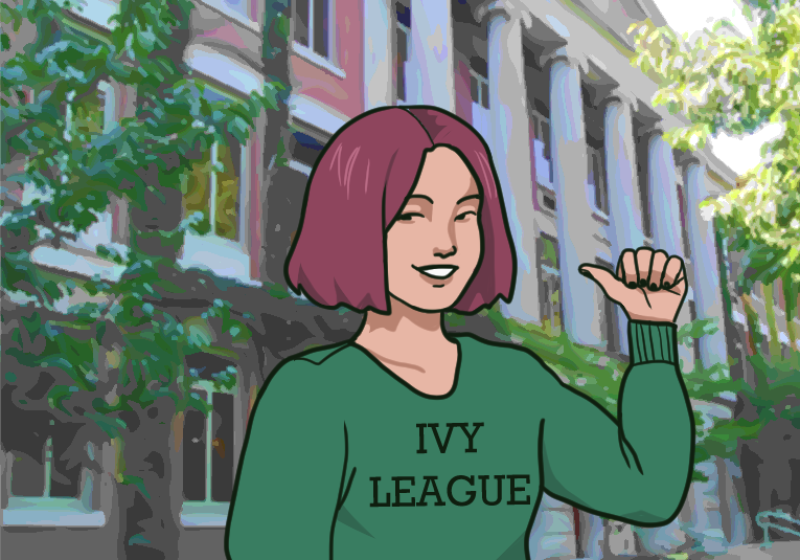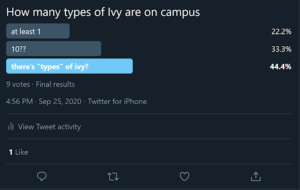UR to be Named an Ivy School
UR has officially been named an Ivy School by the International Society for Horticultural Science. This elite status honors the University’s first-rate horticulture and top-tier landscape which, as the name suggests, equals that of other Ivy schools, including Harvard, Yale, Princeton, Colombia, Cornell, Penn State, and SUNY Geneseo. The rankings are based on quality and quantity of the Ivy, as well as how it affects the campus community on an emotional scale.
Considering this honor and its definition, one would assume that the student body would be proud of our prolific propagations protruding from Morey Hall. But, apparently, they don’t care.
The Campus Times went to twitter to test the knowledge of UR students in an unbiased poll, free of all leading questions and representing an accurate sample size. Here were the results:
In response to the poll, junior Ben Shissler tweeted, “the only types of ivy I know are ‘poison’ and ‘regular.’”
I informed him that poison ivy isn’t actually related to the ivy family, hedera, but in fact, the family of cashews and mango known as anacardiaceae.
“Well it looks like I just know ‘regular’ then,” he responded.
As a proud member of the American Ivy Society, I am absolutely appalled at the lack of knowledge and appreciation for the cultivation of such extraordinary evergreens. There are in fact 500+ different cultivars (“types”) of hedera. Ben, do better.
Junior Rose Mournighan said that, “for us to be an ivy school, either the school has to be made of ivy, for ivy, or to study ivy, and we ain’t none of them. I am incredibly overwhelmed about the ivy all across campus. Sure it’s nice, but it all looks the same. Where is the ivy pruned to look like the Venus de Milo or something?” Mournighan and I spoke at length about the possibilities of an ivy sculpting contest in place of the Winterfest Ice Carving. After all, what does ice have to do with UR? Ivy, on the other hand, evokes feelings of scholarship, academia, and, frankly, of meliora.
“Seeing it on the humanities buildings gives me a sense of tranquility that offsets the slowly creeping horror of getting an English degree at an institution known for its scientific research,” wrote junior Jane Pritchard.
Thank you, Jane. The Ivy and I value you. You are heard.
Most people felt indifferent about the ivy. Sophomore Henry Litsky wrote, “Honestly I don’t really think about it […] but I do like the ivy,” while junior Monique Nichols said, “I guess I like when it turns colors for a week; that’s pretty cool.”
Nichols also said that whenever she looks at the ivy it “brings back fond memories of [her] rejection letter from Cornell,” and she’s not the only one!
To many, the ivy serves as a painful reminder that URis not an actual Ivy League. Of course, I’m not quite sure what they mean by this, because it has been named an Ivy school. That’s what this whole article is about. If anything Harvard isn’t an “actual Ivy League” because it grows Boston Ivy which isn’t even an ivy at all, and they had to remove it all back in the 80s.
“UR isn’t a real Ivy” — ha! We’re as real as it gets when it comes to our superfluous sprouts!
I reached out to many alumni for their thoughts as well, all of whom declined a response, except for Adam Meltzer, graduate student and alumnus, who stated, “It makes me feel old.”
The only person who seemed to share my fervor for the University’s spectacular ivy is sophomore and member of WRUR, Phi Kasem-Beg, who wrote:




